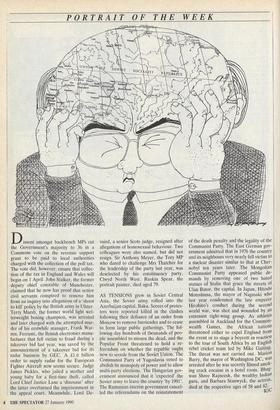PORTRAIT OF THE WEEK
D issent amongst backbench MPs cut the Government's majority to 36 in a Commons vote on the revenue support grant to be paid to local authorities charged with the collection of the poll tax. The vote did, however, ensure that collec- tion of the tax in England and Wales will begin on 1 April. John Stalker, the former deputy chief constable of Manchester, claimed that he now has proof that senior civil servants conspired to remove him from an inquiry into allegations of a 'shoot to kill' policy by the British army in Ulster. Terry Marsh, the former world light wel- terweight boxing champion, was arrested and later charged with the attempted mur- der of his erstwhile manager, Frank War- ren. Ferranti, the British electronics manu- facturer that fell victim to fraud during a takeover bid last year, was saved by the announcement of a takeover bid for its radar business by GEC. A £1.6 billion order to supply radar for the European Fighter Aircraft now seems secure. Judge James Pickles, who jailed a mother and young baby for a first-time theft, called Lord Chief Justice Lane a 'dinosaur' after the latter overturned the imprisonment in the appeal court. Meanwhile, Lord De-
vaird, a senior Scots judge, resigned after allegations of homosexual behaviour. Two colleagues were also named, but did not resign. Sir Anthony Meyer, the Tory MP who dared to challenge Mrs Thatcher for the leadership of the party last year, was deselected by his constituency party, Clwyd North West. Ruskin Spear, the portrait painter, died aged 79.
AS TENSIONS grew in Soviet Central Asia, the Soviet army rolled into the Azerbaijan capital, Baku. Scores of protes- ters were reported killed in the clashes following their defiance of an order from Moscow to remove barricades and to cease to form large public gatherings. The fol- lowing day hundreds of thousands of peo- ple assembled to mourn the dead, and the Popular Front threatened to hold a re- ferendum on whether the republic ought now to secede from the Soviet Union. The Communist Party of Yugoslavia voted to abolish its monopoly of power and to allow multi-party elections. The Hungarian gov- ernment announced that it 'expected' the Soviet army to leave the country 'by 1991'. The Rumanian interim government cancel- led the referendums on the reinstatement
of the death penalty and the legality of the Communist Party. The East German gov- ernment admitted that in 1976 the country and its neighbours very nearly fell victim to a nuclear disaster similar to that at Cher- nobyl ten years later. The Mongolian Communist Party appeased public de- mands by removing one of two hated statues of Stalin that grace the streets of Ulan Bator, the capital. In Japan, Hitoshi Motoshima, the mayor of Nagasaki who last year condemned the late emperor Hirohito's conduct during the second world war, was shot and wounded by an extremist right-wing group. As athletes assembled in Auckland for the Common- wealth Games, the African nations threatened either to expel England from the event or to stage a boycott in reaction to the tour of South Africa by an English rebel cricket team led by Mike Gatting. The threat was not carried out. Marion Barry, the mayor of Washington DC, was arrested after he was secretly filmed smok- ing crack cocaine in a hotel room. Bhag- wan Shree Rajneesh, the wealthy Indian guru, and Barbara Stanwyck, the actress, died at the respective ages of 58 and 82.
gJC


























































 Previous page
Previous page